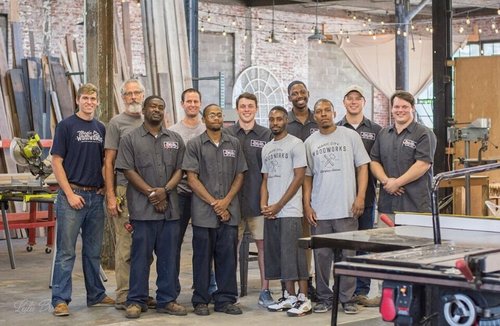The Power of Vocation and Lessons in Leadership: A Conversation with Lawrence Sheffield of Magic City Woodworks
I can remember watching Michael Jordan growing up as a kid and being in total awe of what he was able to do on the court. As an aspiring basketball player, I wanted to be able to do the same moves he did, shoot the same shots he did, etc. Sure, I could practice those things, but reality is pretty stone cold. I wasn’t going to be able to jump from the free throw line and throw down a dunk any time soon (or ever). However, there was one thing Michael Jordan did better than anyone else, that I could try and understand. He made everyone else around him better.
I’m convinced that a big part of being a great leader in the business world looks really similar to what made Michael Jordan so great. Being a leader means creating an environment that takes all of the attention off of you and on to the team. It means helping people reach their full potential and feel comfortable being their true self. It starts with investing in others and getting commitment to the vision of what started it all in the first place.
Alright, alright, enough of the feel-good phrases, what does that look like practically?
Meet Lawrence Sheffield of Magic City Woodworks. Our two-hour conversation about his business felt a lot more like a conversation between two best friends that hadn’t talked in a while. He’s got a slow, simple draw that quickly puts you at ease, but more importantly, a true genuine interest in you as a person. He’s building one of the more successful business minded non-profits I’ve witnessed, but you’d never know it if you talked to him. He’s been featured in Southern Living, been recognized for his work by Plywood People, and recently called Chip Gaines to talk about helping move the mission forward. However, none of what he is doing is about any of the recognition or accolades. For Lawrence, it all starts with investing in people. It’s the reason why everyone who knows him can’t help but want to get involved in his vision to change the lives of men who have fallen on hard times.

Founder & CEO of Magic City Woodworks
Birmingham, AL
How and why did you start Magic City Woodworks?
I started Magic City Woodworks through taking a bunch of small steps. The idea really took place in 2012 but actually got it going and took steps in 2013. During the idea phase, I spent about one year sitting in coffee shops Googling around to see if I could join someone else doing this kind of work. I found that the vision I had didn’t match up with what was out there. It took a year to muster up the resources and the courage to hire the first guy. The idea phase then turned into moving into a 400 square foot shop and working our way slowly from there. It’s really been a series of plateaus that we have ridden out for a while and have kept calling in more and more people to help.
As to why it got started, I don’t know of another way to say it, but it was a calling. I am very passionate about creating opportunities for idle young men in Birmingham. Vocation is a powerful tool to tell a bigger story about people’s lives and a space to learn more about who you are and how you can impact the world around you. Magic City started as a way to invite new friends to a company and woodworking is the medium I decided to use to do that.
How did you identify that medium? Did something spark the idea or was it just something you had experience with?
I was an entrepreneur growing up. I had a little lawn care business as a kid and I used to wash cars. Before I started Magic City, I was a fireman but I had a little side job working with wood. I had all of the tools and understanding and I was making a little money here and there. I actually got saved during my time working as a fireman. During that time, I realized I couldn’t invite guys to come work at a fire station, unfortunately, but I could invite them to come back to a woodshop. It just seemed like a natural step.
So, did you completely start doing this by yourself or were other people involved early on?
Yeah other people were involved. I’m a big fan of asking for help. I probably didn’t ask for help as much as I should have. There was a group of very special people that helped get the organization off the ground. One of my lieutenants actually gave me space to work out of in his one car garage.
Looking at where you are now, has it lived up to your expectations?
It has surpassed my expectations. I wrote a five-year plan in 2014, and it’s really fun to see what God has done with everything. We have a lot going on. I’m actually figuring out ways to slow our growth in a healthy way so that we can focus on the main mission. I want to be able to really stay true to what we are supposed to be.
Slow growth in the sense of not taking on as many people through the program?
Yeah, we of course want to hire more but it doesn’t necessarily make sense at our location. I was asked a question last night about what it would look like with 40 apprentices. It’s not that that’s not where we are going, but we’re not trying to be a mile wide and an inch deep. I’d rather be a quarter of a mile wide and a mile deep. We’re trying to scale up to 20 apprentices at our current location and do it really well.
The way I look at it is like this: I like regions field a lot, you know the Barons? The stadium is beautiful and it’s been built in a way that they aren’t adding seats every week or trying to figure out how to jam more people in there. They’re just trying to figure out how to do it really well with what they have been given and what they have. We talk a lot about what things look like to do what we are doing with excellence.

What has made starting Magic City Woodworks more difficult than you expected?
I worked full-time as a fireman for the first four years. Some nights at the fire station were longer than others. It was a lot of lack of sleep. I also got married in that time frame as well. Here I was, growing as an entrepreneur and growing as a leader and people were depending on me, but I was trying to do everything and so that made it really hard. It felt normal at the time but those that were closest to me told me that I was starting to burn out and couldn’t keep doing both. Looking back now, I didn’t realize how much I lacked margin.
What does a typical day look like for you?
Wake up and go to the gym at 5:30 which gets me to the shop about 6:30. I get some quiet time before anyone else gets there. It’s good for me to get there early and reflect. Our first meeting is at 7:40. That involves leaders across the organization talking about the day and the goals that we want to hit by the end of the day. By 8 am I’m meeting with team members to brief each other on where they are. Then we stretch as an organization. We will literally go out there and stretch before we get started.
I used to work in the shop every day, but now I meet with a lot of folks inside and outside of the organization in the morning. At lunch we all like to come together and do a family-style lunch. A lot of times we do a lunch and learn where we have different folks come in and speak. At 1:00 we do a team huddle up. Everybody puts their hands in will say something like “let’s get it on three.” The guys love that and it’s a good rhythm for us. We work until 3:00 and then we play basketball. We play every day. From 3:15 to 5:00 I turn into a backstop and try and handle anything that is slipping through the cracks. I’m usually out of the door by 5:30 and going home to eat dinner with my wife.
How much of your budget is from donations and how much is from the stuff you are actually selling?
So right now, we are covering about 86% of our budget through our sales right now, which doesn’t include capital campaigns.
Wow, that’s awesome. What’s the make-up of customers for you?
We do a lot of contract work with companies that are doing remodels right now. We’re working for a large construction firm helping them put new tables in their Atlanta office. We also have relationships with a few restaurant chains that are growing like crazy. Some reoccurring customers as well as one-time things for different companies. We just did a bunch of company gifts for a major league baseball team which was a lot of fun. We also work with families that want pieces in their homes.
I should have asked this earlier, how many guys have come through the apprenticeship and have moved on to go work somewhere else?
We have had about 25 apprentices come through and fully commit. We do 6 to 24-month apprenticeships so that looks different for a lot of people. When someone has been there over 2 months we have about an 80-85% graduation rate. Once they get out, we’ve had 100% job placement. That success rate is really due to the apprentices because they’re ready to go find a new job.
They go to work in a lot of different spaces. We’ve had apprentices that have gone on to write code. We’ve got a former apprentice that works at a very large bank here in Birmingham. We’ve got guys that work in cabinet shops and one that started a painting company. There are some really neat dreams that the apprentices are dreaming up and actually going for, once they graduate.
What has been the most rewarding aspect of starting and running Magic City Woodworks?
When I look up and I see a full shop of people working together. At our events when I hear stories of how people enjoy being a part of Magic City Woodworks. When I get to zoom out and see the bigger picture, that’s when it becomes most rewarding. When I get to see that this is actually a thing now and people work here for a living and the culture is constantly getting better.
What do you think is the biggest misconception about non-profits?
That you can’t make much money. I didn’t understand that when I first started. I was very confused about that and I think that’s a big misconception. A lot of nonprofits don’t have the ability to make money and there’s nothing wrong with that. It’s a lot different if you’re doing vocational training. We’re a social impact company producing a product.
The other misconception is that you have to suffer as a non-profit. For instance, the misconception that people shouldn’t have benefits or should be sacrificing income. We want to pay people competitively based on their talent, you know, and we want to hire the best people we can because it ultimately that will serve the mission better.


You must be logged in to post a comment.